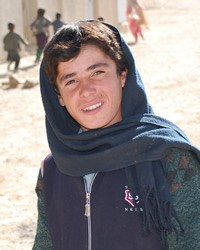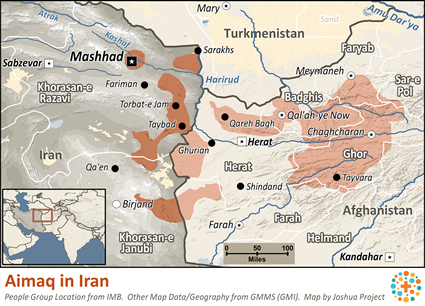A collection of Sunni and primarily Persian-speaking nomadic and semi-nomadic tribes make up the Aimaq people group. "Aimaq" means "tribal people," which distinguishes the Aimaq from the nontribal population in the area, the Persians (Fariswan) and Tajiks.
The four tribes of the Char Aimaq are the Jamshidi, the Aimaq-Hazara, the Firuzkuhi, and the Taimani. The tribes of Char Aimaq date to the sixteenth and seventeenth centuries, when the groups were unified by chiefs coming from outside the area. Descendants of these founders are still influential in tribal affairs, although they have lost their traditional power.
The traditional home of the ethnically mixed Aimaq tribes stretched from northeastern Iran into western and central Afghanistan. Today, a large majority of the Aimaq live in Afghanistan, with significant populations in Iran and Turkmenistan and smaller groups in Pakistan and Tajikistan.
Never politically united, tribal alliances joined them together for protection against invaders. Aimaq are known as formidable warriors. For such a large population, little has been recorded about them, leaving them relatively obscure.
The nomadic Aimaq have traditionally traversed through all of Afghanistan and Iran. They helped to defend Afghanistan against the Soviet invasion and participated in the ensuing civil war, on the side of the Mujahadin. A relatively small though diverse group with no real territorial base, the Aimaq have made no claim for self-determination.
Once nomadic peoples, the Aimaq were forced by cycles of severe drought and war into semi-nomadic lives, traveling seasonally to graze their herds of sheep and goats and/or subsisting as sedentary farmers and carpet weavers in mud-brick villages. They also trade with villages and farmers during migrations for pastures for their livestock. The material culture and foodstuffs of the Aimaq include skins, carpets, milk, dairy products, and more. They trade these products to settled peoples in return for vegetables, grains, fruits, nuts, and other types of foods and goods.
Tribalism is strong among all Aimaq groups. For example, the Aimaq settle feuds by tribal rather than by government authorities. Tribal law tends to override national law and even some Islamic law.
In sharp contrast with other societies in rural Afghanistan and in Iran, the Aimaq accord women high status: women participate in group discussions, even when outsiders are present. Based on clan and extended family, the Aimaq are led by men and trace ancestors through male lines.
The Aimaq celebrate marriage as the most important life event. By tradition they arrange marital unions in early childhood. Marriage takes place when a girl is 13 or 14, usually to a blood relative slightly older, 16-20, or as a second wife to a much older man in his 40s. Among the Taimani and Firuzkuhi tribes, girls marry at age 18 and may reject a father's choice of husband.
The Aimaq once spoke a common language. Today, however, most Aimaq speak dialects resembling Dari (Afghan eastern Farsi) mixed with words of Mongolian and Turkic origin.
In all five countries where they are present, the Aimaq are considered a frontier people group, meaning Christians of any kind constitute less than 0.1% of the population and that the Christian population is insufficient to impact the people group with the gospel.
Aimaq tribes primarily hold to the Hanafi branch of Sunni Islam. However, their religion includes pre-Islamic beliefs that would put them in the folk Islamic category. They depend on Allah for eternal salvation, but on the spirit world for their daily needs. Almost none of them depend on Jesus Christ, the Risen Savior.
No significant Christian resources are available in the language of the Aimaq. They need a Bible translation and other resources such as the JESUS Film. As a frontier people, they need gospel workers to ignite movements among them.
The Aimaq peoples need abundant rain so their livestock and their crops can flourish. Their tribal and nomadic character has acted as a barrier to becoming politically active or attaining positions of power. As a result, they lack the avenues through which to communicate their concerns of survival under very difficult conditions.
Pray for a spiritual hunger that will allow Aimaq people to accept the lovingkindness of Christ.
Ask God to give the church in Iran a vision for reaching the Aimaq people with the gospel.
Pray for a translation of the Bible and other resources into the Aimaq language.
Pray for a disciple making movement among each Aimaq people.
Pray for abundant rain in the Aimaq homelands so their crops and livestock can thrive.
Scripture Prayers for the Aimaq in Iran.
https://joshuaproject.net/people_groups/21454/IR
https://en.wikipedia.org/wiki/Aimaq_people
https://www.everyculture.com/Africa-Middle-East/Aimaq.html
https://minorityrights.org/minorities/aimaq/
| Profile Source: Joshua Project |

























